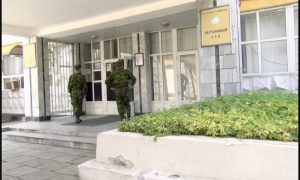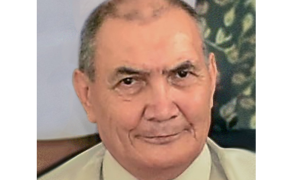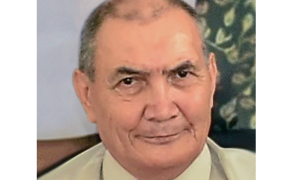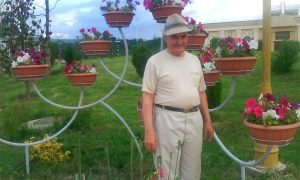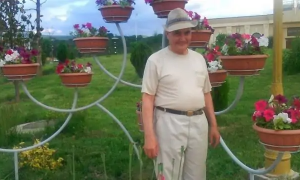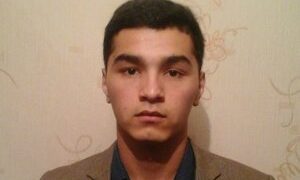Prisoner of conscience Shamil Khakimov was stopped from attending his only son’s funeral in September, and has not been hospitalised for the specialised medical treatment he needs. This is despite multiple reminders – the most recent on 13 September – from the UN Human Rights Committee that the regime’s human rights obligations require this. Freedom of religion and belief and other human rights of prisoners of all faiths continues to be violated.
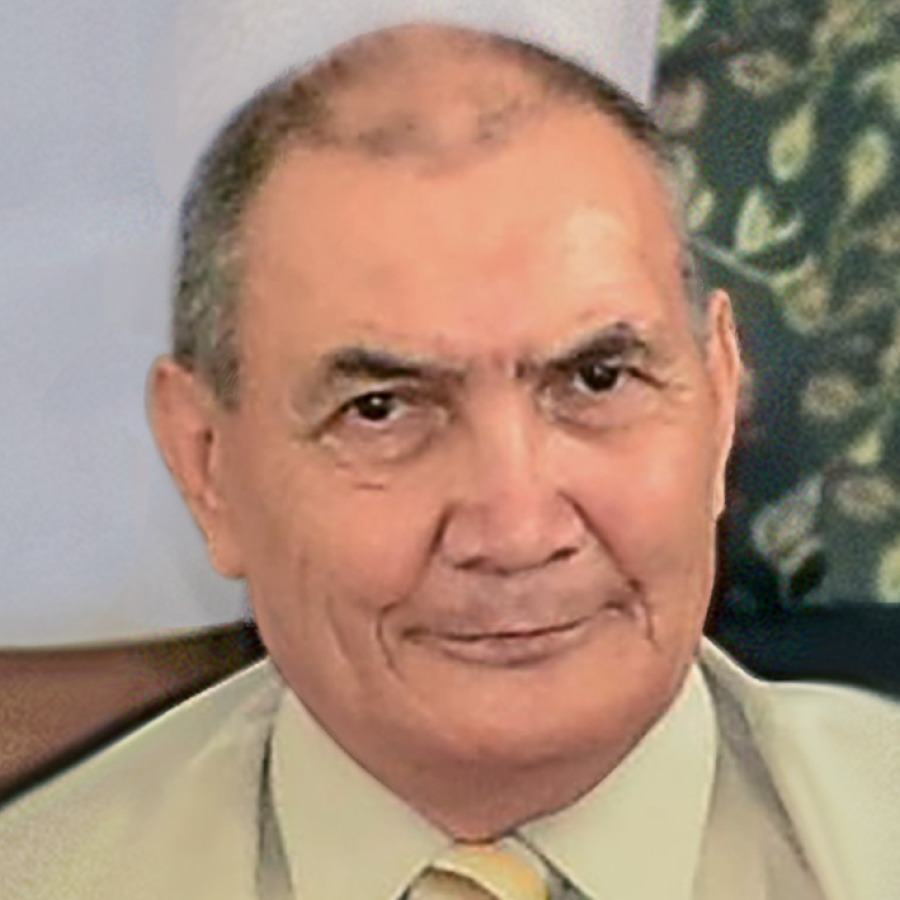
Prisoner of conscience Shamil Khakimov is suffering from “severe emotional distress”, Jehovah’s Witnesses stated on 6 October as his only son died in September – and the regime stopped him from attending the funeral. Both Prison Governor Farukh Jalolov and another prison official refused on 8 8 October to explain to Forum 18 why they refused to allow Khakimov to attend his only son’s funeral (see below).
Prisoner of conscience Khakimov’s son was the only person allowed to visit him. Like other prisoners, he has been denied other visitors (see below).
Tajikistan has also repeatedly not hospitalised seriously ill prisoner of conscience Khakimov for the specialised medical treatment he needs. This is despite multiple reminders – the most recent on 13 September – from the United Nations (UN) Human Rights Committee that the regime’s human rights obligations require this (see below).
“Nothing has changed,” Jehovah’s Witnesses noted, pointing out that even after transfer to the prison’s so-called medical unit, Khakimov “he does not receive professional medical help there, and he continues to bandage his legs on his own. In fact a new open ulcer developed on his foot” (see below).
The regime has repeatedly failed to protect prisoners health, including denying treatment to those with Covid-19 symptoms. Human Rights Watch in 2021, the UN Human Rights Committee in August 2019, and the UN Committee against Torture in June 2018 have all condemned the serious health risks the regime subjects prisoners to (see below).
The regime repeatedly violates the UN Standard Minimum Rules for the Treatment of Prisoners (known as the Mandela Rules – A/C.3/70/L.3) throughout its prison system, various officials having claimed to Forum 18 that they do not know what they are (see below).
People of all faiths have told Forum 18 that clergy and co-believer visits to prisoners have long been banned. Prisoner of conscience Khakimov is only allowed to read his Bible when he is alone, and Muslim male prisoners are not allowed to do namaz prayers or read the Koran. “The lives of prisoners in general worsen year by year and month by month,” one Muslim told Forum 18. “They are insulted and tortured, and their freedom of religion and belief is the last thing the regime cares about,” they stated (see below).
Petitions for release from prisoner of conscience Khakimov are still being illegally blocked, and the office of the regime’s “Human Rights Ombudsperson” (to which a copy of a petition to President Rahmon was sent) has refused to discuss the multiple violations of prisoners’ human rights, or to indicate whether the “Human Rights Ombudsperson” is doing anything to defend human rights (see below).
After three years since he was jailed in January 2020, the family of Muslim prisoner of conscience Sadriddin Mulloyev has been allowed to visit him. The family said that Mulloyev is well, and a pardon has not been requested as he is not guilty of a crime to be pardoned from (see below).
Jailed conscientious objector to military service Rustamjon Norov was freed under presidential pardon on 21 September. His family had requested this, and told Forum 18 that: “Rustamjon is fine and is healthy.” Despite claims in 2019 to the UN Human Rights Committee that a draft alternative service law is being prepared, there is no sign that a law in line with international human rights obligations has been drafted or will be passed (see below).
“I am guilty of nothing”
On 10 September 2019, Jehovah’s Witness Shamil Rasulovich Khakimov (born 30 January 1951) was jailed for seven years, six months for allegedly “inciting religious hatred”. “I am guilty of nothing,” he told the court.
The sentence was reduced in summer 2020 by two years, three months. On release in May 2024, aged 73, Khakimov would be banned from exercising his freedom of religion and belief until May 2027.
Prisoner of conscience stopped from attending funeral of his only son
Prisoner of conscience Khakimov is suffering from “severe emotional distress”, Jehovah’s Witnesses stated on 6 October as his only son died in September – and the regime stopped him from attending the funeral. Khakimov’s son was the only person allowed to visit him in prison.
The United Nations (UN) Standard Minimum Rules for the Treatment of Prisoners (known as the Mandela Rules – A/C.3/70/L.3) state in Rule 70: “the prisoner should be authorized to go, either under escort or alone, to the bedside of a near relative or significant other who is critically ill, or to attend the funeral of a near relative or significant other”.
Both Prison Governor Farukh Jalolov and Adam (who refused to give his last name), Chief of the Special Unit (which he refused to describe) on 8 October refused to say why they refused to allow Khakimov to attend his only son’s funeral.
Specialised medical treatment in hospital repeatedly denied
Prison authorities have repeatedly denied seriously ill prisoner of conscience Khakimov the specialised medical treatment he needs. The 70-year-old has a bad leg “which smells like rotten meat” and has had coronavirus symptoms.
Rule 27 of the Mandela Rules states: “All prisons shall ensure prompt access to medical attention in urgent cases. Prisoners who require specialised treatment or surgery shall be transferred to specialised institutions or to civil hospitals.” The Rules also state: “Clinical decisions may only be taken by the responsible health-care professionals and may not be overruled or ignored by non-medical prison staff.”
“He does not receive professional medical help”
Although Khakimov’s coronavirus symptoms had improved, his leg has not improved, and he has not been hospitalised for the specialised medical treatment he needs, Jehovah’s Witnesses told Forum 18 on 9 March 2021. On 6 October Jehovah’s Witnesses told Forum 18 that “Unfortunately, nothing has changed, except the fact that in March Khakimov was transferred to the medical unit of the prison.”
They also noted that even in the so-called medical unit, “he does not receive professional medical help there, and he continues to bandage his legs on his own. In fact a new open ulcer developed on his foot.”
Neither Khakimov, nor his family, nor his lawyer have received medical reports on his condition, even though the Mandela Rules state: “all prisoners should be granted access to their [medical] files upon request. A prisoner may appoint a third party to access his or her medical file.”
Both the the UN Human Rights Committee and the UN Committee against Torture have called for Tajikistan to implement the Mandela Rules. Yet Prison Governor Farukh Jalolov told Forum 18 on 9 March 2021: “I do not know what the Mandela Rules are.” A Supreme Court official similarly denied knowledge of the Mandela Rules.
Prison Governor Jalolov also told Forum 18 that prisoner of conscience Khakimov was not hospitalised when he had coronavirus symptoms as: “He just had a cold and that is all. The rest is lies”.
UN Human Rights Committee repeatedly ignored
The UN Human Rights Committee on 19 March, with reminders on 18 June and 13 September, instructed Tajikistan that it must under its human rights obligations: “ensure, without delay, that Mr. Khakimov receives adequate medical treatment at a specialised medical institution in accordance with his health care requirements, and that an alternative to imprisonment is secured for Mr. Khakimov, while his case is under consideration by the Committee or until further notice.”
Jehovah’s Witnesses told Forum 18 on 6 October that Tajikistan “has failed to take any steps to follow the request dated 19 March of the UN Human Rights Committee for interim measures – to transfer Khakimov to a civil hospital outside of prison and free him from imprisonment.”
Lieutenant-General Mansurjon Umarov, Head of the Justice Ministry’s Chief Directorate for the Enforcement of Criminal Punishments, and his departmental deputy heads Colonel Rustam Balazoda and Colonel Ilkhomjon Makhmudzoda, refused on 7 October to discuss the repeated denial of Human Rights Committee requests with Forum 18.
Long-standing prison visit bans
Prisoner of conscience Khakimov’s son was the only person allowed to visit him in prison. Visits by his co-believers have been banned, including since Khakimov’s son died in September.
Muslims told Forum 18 on 6 October that Muslim prisoners are denied visits by imams, friends or relatives outside the immediate family. They asked to remain anonymous for fear of state reprisals.
Various members of a variety of non-Muslim religious communities told Forum 18 in October that they also face bans on clergy visits, one noting that the ban had been enforced “for at least 10 years”. All asked that they and their communities remain anonymous for fear of state reprisals, one commenting that they unfortunately cannot discuss human rights issues.
Rule 65 of the Mandela Rules states in part that qualified co-believers who are not prisoners: “shall be allowed to hold regular services and to pay pastoral visits in private to prisoners of his or her religion at proper times. Access to a qualified representative of any religion shall not be refused to any prisoner.”
Jehovah’s Witnesses told Forum 18 that prisoner of conscience Khakimov has a Bible, but is only allowed to read it when no one is around. He is also banned from speaking to others about his faith, but is allowed to receive letters from other Jehovah’s Witnesses worldwide
“The lives of prisoners in general worsen year by year and month by month,” one Muslim told Forum 18. “They are insulted and tortured, and their freedom of religion and belief is the last thing the regime cares about,” they stated.
Petitions for release still being blocked
In December 2020 and January 2021, the prison administration, Khujand Prosecutor’s Office, and Khujand City Court rejected legal appeals to free prisoner of conscience Khakimov, giving contradictory reasons. The Supreme Court and Sugd Regional Court both rejected the appeal claiming an unspecified “technical mistake” in the appeal. Illegally, neither court provided a copy of its decision.
On 29 March 2021 prisoner of conscience Khakimov gave the prison authorities an appeal for a pardon to be sent to President Emomali Rahmon. Five months later, at the end of August, prison authorities told Khakimov that they had not sent his appeal to the President as he “did not admit his guilt.”
Jehovah’s Witnesses note that the law does not require such an admission – which Khakimov has not made – in a petition for a pardon.
Prison Governor Jalolov refused on 5 August to explain to Forum 18 why prisoner of conscience Khakimov was not released from prison as the UN Human Rights Committee had then twice requested. Jalolov also claimed: “We hope that he can be amnestied soon during the golden amnesty [30 years of independence on 9 September] soon.”
Jalolov did not state that he was obstructing attempts to secure the amnesty hope he claimed to have.
Prisoner of conscience Khakimov asked his lawyer to send a new petition to President Rahmon, which the lawyer did in early September. A copy of was also sent to the Human Rights Ombudsperson.
Prison governor Jalolov on 7 October did not answer his phone. Adam (who refused to give his last name), Chief of the Special Unit (which he refused to explain) on 7 October refused to say why the prison authorities withheld Khakimov’s petition, and refused to discuss the case.
Prisoner of conscience Khakimov’s prison address is:
Tajikistan
Viloyati Sugd
735700 Shahri Khujand
Muassisai islohii YaS 3/5
Khakimov Shamil Rasulovich
